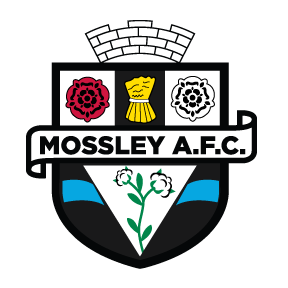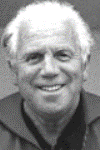
Jock Anderson
Scottish-born Jock Anderson signed for Mossley in 1934, scoring 47 goals in 47 games in the 1934-35 season. It was to be the beginning of a lifelong association with the Club. He scored 22 goals in 38 appearances the following season before being snapped up by Rotherham United where he was a regular scorer until the War intervened. By now a qualified chiropodist with a practice in Mossley, Jock returned to Seel Park as trainer and physio in 1948. Anderson was Club physio as the team appeared at Wembley in the 1980 FA Trophy Final. Following Ronnie Ward’s death in 1981 Jock was appointed Club President and remained in the role up to his death in 1991. The main stand at Seel Park was named the James Anderson Stand in his memory.
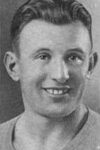
Sammy Cowan
Born in 1902, Cowan made a total of 407 Football League appearances in a career that saw him claim three England caps, a second division Championship medal and three Wembley final appearances. In the summer of 1937, Cowan was appointed player-manager at Mossley. He brought in centre forward David ‘Dai’ James (later transferred to Chelsea) from Leeds United and James responded with 42 goals (including six in one game). Cowan led Mossley to a highly respectable 7th place in the then powerful Cheshire League and also to 2-1 Manchester Challenge Shield Final win over Ashton National at Hurst Cross. Cowan made 39 appearances for Mossley, scoring one goal. At the end of the season Cowan resigned to become Brighton & Hove Albion’s trainer. He then accepted the Manchester City manager’s job in 1946. Sam Cowan collapsed on 5th October 1964 while refereeing a charity match in aid of Sussex wicketkeeper Jim Parks. Cowan, aged 62, died in the dressing room.
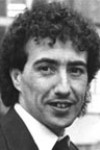
David Moore
Former Manchester City apprentice Dave Moore was snapped up by manager Bob Murphy in August 1974 from Radcliffe Borough for a £100 fee. He went on to become one of the most prolific strikers in non-league football with Mossley over the next nine years alongside centre forward Leo Skeete. He was top scorer five times in seven seasons between 1974 and 1981. Dave Moore won two Northern Premier League championship medals with Mossley and played in the 1980 FA Trophy Final at Wembley before ending his career playing Sunday football for the New Streetbridge Inn in the Gorton Sunday League.
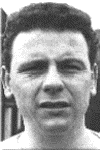
Lennie Dickenson
Leonard Dickenson was born in South Elmsall, Yorkshire on 6th March 1942. He signed as a professional for Sheffield Wednesday in February 1960, before moving to Oldham Athletic for a £100 fee in June 1961. Spells with Witton Albion and Buxton followed before he arrived at Don Wilson’s Mossley in January 1966. Lennie would captain the team to runners-up in the Cheshire League (Mossley’s best position for 50 years), the 1st Round proper of the FA Cup and the Quarter Finals of the inaugural FA Trophy. Lennie Dickenson made a total of 338 appearances for Mossley and scored 84 goals.
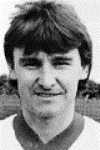
Jimmy O'Connor
James Kelly O’Connor was born in Lanark, Scotland on 27th June 1951. He began his playing career in Scottish junior football with Kirkstyles before moving south and signing professional for Bury in July 1970 as a right winger. He made 7 appearances for Bury scoring 2 goals before injury cost him his place with the club and he was released. Having been recommended to Mossley boss Don Wilson he duly signed for Mossley in August 1972 and played in Mossley’s first ever Northern Premier League game at South Liverpool. He quickly became a fixture in the side and remained so through the next two seasons making a total of 191 appearances scoring 30 goals before being transferred to Macclesfield Town in May 1975. Following successful spells at Macclesfield and Runcorn, O’Connor played for Droylsden and cost Mossley a three figure fee when Bob Murphy re-signed him in August 1978. By now a central midfield player O’Connor became a key figure in the all-conquering Mossley side of the late 70’s and early 80’s and remained with the club well beyond the break-up of the Wembley team. In two spells with Mossley he made an incredible 613 appearances (by far a Club record) scoring 77 goals, as well as managing the Lilywhites.
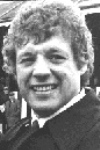
Bob Murphy
Robert Murphy was born in Moston, Manchester on 29th April 1932.
Murphy was asked to become a scout for Mossley under Manager Don Wilson. When Wilson resigned in November 1972 Murphy was promoted to Assistant Manager under new boss George Sievwright, and when the Scotsman was sacked in January 1974 Murphy was appointed Caretaker-Manager, a post he held until the end of the season when he was offered the job on a permanent basis.
The £100 signing of striker Dave Moore had a great influence on the team and the arrival the following January of Leo Skeete from Rochdale was the coup-de’tat. Murphy’s team finished 9th in the 1975-76 season and reached the final of the Northern Premier League Cup for the first time losing to Boston United in a two legged final.
The 1976-77 season started well enough but the team ran into trouble by November and following a 5-2 home defeat by Goole Town on 13th November Murphy was dismissed. Spells with Stalybridge Celtic and Northwich Victoria followed and Vics were top of the League when Murphy was invited back to Seel Park in January 1978 following Dick Bate’s dismissal.
What followed was the greatest spell in Mossley’s history. Manager of the Month awards became commonplace for Murphy as his side marched to the NPL title in 1978-79 scoring an amazing 117 League goals and winning the League Cup against Murphy’s former club Northwich.
The 1979-80 season saw Murphy’s team retain the NPL title with a dramatic 31 match unbeaten run in League and FA Trophy which saw the Lilywhites once more crowned champions and Murphy’s greatest moment as he led his team out at Wembley for the 1980 Trophy Final at Wembley Stadium. Mossley lost the final but Bob Murphy had written himself into Lilywhite folklore; the song ‘We’re on the march with Murphy’s army’ echoed around the town as Murphy and his team were given a heroes welcome on their return.
The 1980-81 season saw Mossley go out of the Trophy at the quarter final stage and finish runners up in the League but caused an FA Cup upset as Crewe Alexandra were beaten in 1st Round at Seel Park.
The following season 1981-82 saw Mossley again as runners up in the League and again reaching the final of the NPL Cup, this time losing by the only goal to Gainsborough Trinity at Maine Road. Then in Murphy’s last full season in charge the Lilywhites finished League runners up for the third successive season and were unlucky to lose an FA Cup tie at Huddersfield Town.
The following January Murphy became Manager of Southport and stayed there until December 1984. He spent the remainder of that season at Barrow and following term he was back in management again this time with Buxton and he was to stay there for seven years up until October 1992 when he decided to retire from football management.
However, when Mossley found themselves bottom of the NPL and with a very poor team Murphy came back to attempt to save them from relegation in December 1992. An almighty effort to save a desperate situation ensued but despite Murphy’s best efforts the team was relegated from the top flight of the Northern Premier League and Murphy left Management for the last time.
When Mossley again found themselves manager-less in the 2001-02 season Bob again stepped into the breach and acted as caretaker manager for two games prior to the appointment of Ally Pickering.
He was popularly appointed Club President of Mossley AFC following the passing of his predecessor Jim Wharmby in 2003.
Bob Murphy sadly passed away on Wednesday 17th February 2016.
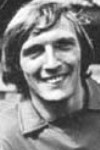
Gary Pierce
Gary Pierce was born on the 2nd March 1951 in Bury and played as a junior for both his home town club and Bolton Wanderers before signing for Mossley as a 19 year old in October 1970. He made his debut for the Lilywhites with a nervous display in a 5-3 win at Hyde United on 31st October 1970 and was rarely tested in the next two games, 4-1 and 5-1 wins over Oswestry Town and Burscough respectively, but then kept four clean sheets in the next five games with some brilliant displays.
By now League scouts were flocking to watch him and in his most memorable Mossley game – an FA Trophy tie at Hednesford, he made a string of unbelievable saves as Mossley won 2-0; a performance that persuaded First Division Huddersfield Town to up their interest. Three weeks later and after just 12 games in a Mossley shirt he was transferred to the Terriers for a bargain £2,250 fee. He made 23 first team appearances for Huddersfield before being sold to Wolves for £40,000.
His greatest moment came in the 1974-75 Football League Cup Final at Wembley Stadium when he gave an amazing ‘man of the match’ display on his 23rd birthday to help Wolves beat Manchester City 1-0. He made 40 appearances for Wolves and had later spells with Barnsley (81 appearances) and Blackpool (27 appearances) before returning to non-league with Accrington Stanley.
He re-signed for Mossley in the twilight of his career in 1986 and he made 40 appearances for the Lilywhites in the 1986-87 season before retiring from playing.
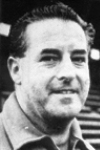
Eddie Quigley
Born in Bury on 13 July 1921, Eddie Quigley had a notable Football League career record scoring 180 goals in 337 appearances.
He joined Mossley as Player-Manager in the summer of 1957. Mossley finished bottom of the Cheshire League winning only seven out of 42 games. Quigley himself scored 10 goals in 44 games. The following season 1958-59 saw Mossley climb to 15th position and Quigley netted 19 goals in 42 appearances and the side also reached the final of the Manchester Intermediate Cup. Quigley scored twice but Ashton United netted six and Mossley lost.
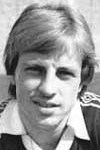
Eamonn O'Keefe
Eamonn O’Keefe was born in Manchester on 13th October 1953 and played as a teeneger for Stalybridge Celtic before a spell with Plymouth Argyle. He didn’t make the Plymouth side but went instead to play for top Saudi Arabian Club Al Hilal, before returning to Manchester and signing for Mossley in December 1976 under Howard Wilkinson. Upon Bob Murphy’s return to Seel Park as manager a year later O’Keefe helped Mossley to the Northern Premier League & Cup double in 1978-79 and earned a place in the England C side. He played against Scotland and Holland in the May 1979 tournament scoring the winning goal against Holland in the final. O’Keefe was then snapped up by Gordon Lee at Everton for a £25,000 fee (money that paid for the erection of the Park End stand at Seel Park) and he went on to make 40 appearances for Everton scoring 6 goals and was capped by the Republic of Ireland (thanks to his fathers origin) on 5 occasions and made a further 4 appearances as an over-age player in the under 21 side. He was then transferred to Wigan Athletic for a £60,000 fee and had later spells with Port Vale, Blackpool, St. Patrick’s Athletic (Ireland) and Chester City and a brief spell as a manager in Ireland with Cork City. Eamonn O’Keefe made a total of 113 appearances for Mossley scoring 50 goals.
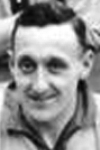
Jackie Roscoe
Centre forward Jackie Roscoe signed for Mossley from Witton Albion in August 1928 and scored a hat-trick on his debut against Altrincham. He went on to smash the club scoring record for the first time with 45 goals (including six in one game, a 6-0 win over Middlewich) in 43 appearances.
The following season Roscoe equalled his previous year’s feat with another 45 goals this time in 49 appearances and again managed six in a game (a 7-1 win over Altrincham).
The 1930-31 season was to see Roscoe at the peak of his powers for Mossley though as he crashed home a still un-bettered 58 goals in just 47 appearances and at one stage scored in 13 successive games (another club record). Roscoe’s progress was being watched by neighbours Oldham Athletic though and he was to sign for them for the 1931-32 season.
Six years later and after spells with Oldham, Macclesfield and Hyde United Roscoe returned to Mossley following the sale of top scorer Dai James to Chelsea. Roscoe scored 30 goals in 49 appearances that season before World War II intervened and Jackie Roscoe’s Mossley career ended. He scored an amazing total of 176 goals in just 188 appearances for Mossley.
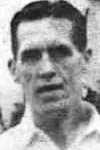
Jack Shaw
Jack Shaw signed for Mossley in August 1936 after earlier spells with Oldham Athletic, Blackpool and Lytham. After making 44 appearances in the 1936-37 season Shaw returned to League football and had spells with Birmingham City and Watford during the War before returning to Mossley in 1946. He made 50 appearances that season and was to continue as the first name on the team sheet for the next five years until his retirement from football in May 1951. Shaw was presented with a clock by Mossley AFC Chairman George Clayton upon his retirement from playing. Shaw was a legend during his time at Mossley and in one famous incident scored a goal by dribbling through the entire Witton Albion team before scoring a great goal. Shaw had starred in the 1949-50 FA Cup run and, such was his influence, that despite suffering from a severe bout of flu he played in the FA Cup 2nd Round replay against Nuneaton Borough. In all Jack Shaw made 238 appearances for Mossley.
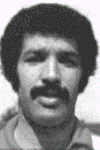
Leo Skeete
Born in Liverpool on 3rd August 1949, Leo was leading scorer for Rochdale in the 1973/74 season before a change in management at Spotland saw him left out of the side and available for loan. That loan arrangement saw Leo arrive at Seel Park under the management of Bob Murphy in January 1975 after scoring 15 goals in 40 games for Rochdale.
Leo made his Mossley debut in a 2-1 home win over League leaders Boston United on 18th January 1974. His first goal came in a 1-0 win at Stalybridge Celtic three days later whilst striking up an almost instant understanding with fellow front man, the equally prolific Dave Moore.
Leo was signed on a permanent basis on a free transfer in August 1975 and having moved home from Liverpool to Oldham was also given employment by the then Club President, the late Ronnie Ward’s engineering company Weldem Ltd in Mossley.
The 1976/77 season saw Leo break the Club’s post war goal-scoring record when netting 45 goals in just 60 appearances; his partnership with Moore yielding an incredible 77 goals in a season that saw future-England manager Howard Wilkinson as Mossley Player/Manager.
The 1977/78 season saw Leo win the first of two successive Mossley ‘Player of the Year’ awards whilst scoring 26 goals in 57 appearances as Bob Murphy returned as Manager.
Leo was team captain as Mossley retained the League title in 1979/80 and when Mossley defied the odds to reach Wembley in the FA Trophy Final it was Leo Skeete who led out the team behind manager Murphy. Leo scored 29 goals in 55 appearances that season. He also won representative honours with the NPL and was named in the England C squad in 1980, though to many peoples surprise Mossley team mate Ian Smith made the England team but not Leo.
The 1981/82 season was to be his last as a Mossley player having scored 7 goals in 14 appearances Leo played his final Mossley game in a 1-0 defeat at Southport on 5th December 1981 before a £3,500 transfer fee took him to Runcorn where he helped them to win the Alliance Premier League title.
Leo retired from playing two seasons later following an injury hit spell with Altrincham.
Leo Skeete made a total of 350 appearances for Mossley scoring a remarkable 174 goals. He is second only to his former team-mate Dave Moore in Mossley’s all time goal-scorers list.
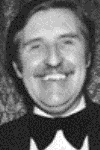
Jim Murphy
Jim Wharmby’s connection with Mossley Football Club goes back to before the war, when as a young boy he supported the team, progressing onto the committee in 1952 and becoming Secretary in 1958.
During his time as secretary, along with his good friend and Club Chairman Ian Morecroft, he was instrumental in Mossley moving up from the Cheshire County League to the Northern Premier League in 1972.
After 20 plus years as Secretary, Jim remained on the committee during the glory days of the late 70’s and early 80’s before becoming vice-chairman and then Chairman in 1983, a position he held until 1987. At this time he received a long service award in recognition of his services to football and Mossley AFC from the Football Association, to go with a similar award he received from the Northern Premier League two years previously.
It wasn’t long after in 1990 that he was asked once again to come back on board as the club faced yet more problems.
Continuing to be ever-present after this, Jim was appointed Club President in the late 1990’s.
Jim’s loyalty to Mossley AFC was well-known and he was a popular figure, and figurehead, at Seel Park for many years.
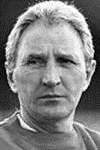
Howard Wilkinson
Born in Sheffield on 13th November 1943. His managerial career started at Boston United as player-manager, and during this time he gained a degree in physical education at Sheffield University. He also spent time during this period teaching at Abbeydale School in Sheffield and led Boston to two successive Northern Premier League titles.
In December 1976 he was enticed away from Boston to join Mossley as Player-Manager and helped the Lilywhites climb the Northern Premier League table to finish 9th being unbeaten in 19 successive games in the bargain. The side also won the Manchester Senior Cup beating Droylsden 12-3 on aggregate in the final. Wilkinson made 30 appearances for Mossley scoring just one goal. He left Mossley at the end of the season but not before taking the unprecedented step of appointing his own successor at Seel Park.
Wilkinson was appointed FA regional director of coaching for the North East before being tempted back into the pro game by Notts County. He managed England’ s semi-professional team and in 1982 he became the coach for the England Under-21 team. He managed Notts County in the middle of three seasons they spent in the First Division during the early eighties and achieved 15th place in the table on very low gates. He moved to Sheffield Wednesday in the 1983 close-season and in 1983-84 took Wednesday back to the First Division in his first season.
Wilkinson then went on to manage Leeds United. On his arrival at Elland Road, he staved off relegation to Division 3 in his first season. With the inspired signing of Gordon Strachan, and the arrival of defensive solidity in the shape of Chris Fairclough and Mel Sterland, Leeds looked set to make a promotion push.
Leeds went top before Christmas, Lee Chapman’s arrival brought more goals, and the title was sealed in the last game of the season. 1991-92 saw Wilkinson get the better of Sir Alex Ferguson in a season-long tussle for the title.
He went on to become FA Technical Director, managing the Under-21 side and taking charge of the national side first after the departure of Glenn Hoddle and then following Kevin Keegan’s resignation.
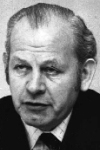
Sir Walter Winterbottom
Walter Winterbottom was born in Oldham on 31st January 1913. He began playing football as a youngster and was spotted playing for Royton Amateurs and given a trial for Mossley at the end of the 1934-35 season making 1 appearance that season. He impressed enough though to be invited back the following season and was signed on amateur forms by Secretary/Manager Clifford Tarr. A strong and skilful centre half Winterbottom became a regular in the Mossley team the following season and helped Mossley to a mid-table position in the Cheshire League. He made 22 appearances and was then one of four Mossley players to join Football League clubs at the end of the season.
Winterbottom was spotted by Manchester United talent scout Louis Rocca who considered that he had the potential to be a great half-back. His chance arose in 1936 when he replaced the injured George Vose in the United team and was later to keep him out of the side. However, in the following season 1937-38 Winterbottom suffered from ankylosing spondylitis, a disease of the spine. The disease forced him to retire from the game at an early age, after making only 27 appearances for Manchester United’s first team. Before injury forced him out of the game prematurely he was reckoned to be one of the hottest young properties in the game.
Whilst pursuing a career in professional football, Winterbottom was also a schoolmaster: ‘Before the War there was no floodlit football and league matches were generally played on Saturdays. Thus whilst playing for United, I was able to be a schoolmaster, then a student at Carnegie Physical Education College where subsequently I was appointed lecturer’. Not long after this his teaching skills were noted by the F.A: ‘In 1938, the F.A ran a summer school/conference at Carnegie and invited me to join the staff, it was here that Sir Stanley Rous and other F.A. coaching officials first noted my capabilities.’
During the Second World War, Walter Winterbottom served in the RAF as a wing commander. On demobilisation he was appointed F.A. Director of Coaching with responsibilities of managing England teams, amateur and professional, a post which he held from 1946 until 1962. Whilst manager of England he guided the team to four World Cup Finals and was awarded the OBE for his services to football. As England manager he set up England’s youth and under-23 teams. The CBE followed in 1972. In 1978 he was awarded a knighthood in recognition of his services to sport, as director of the Sports Councils and chairman of the Committee of Sport in the Council of Europe.
Sir Walter Winterbottom passed away age 89 in February 2002.
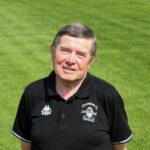
Steve Tague
Steve Tague started volunteering at Mossley AFC in the summer of 1977 after answering an appeal to help on the ground during pre-season. He was elected onto the management committee prior to the 1977-78 season and helped out around the ground preparing Seel Park for matches and spectators.
Steve was responsible for arranging transport to away games during the 1970-80 season; a season in which he had to arrange 32 coaches to take Lilywhites supporters to Wembley stadium for our FA Trophy final.
In 1982, Steve was appointed as commercial manager at the club, a role he held at the same time as his work on the management committee.
After full-time employment took Steve out of the area, he stepped down from his roles but returned to the club in December 2003 carrying out a variety of voluntary roles, including pitch preparation.
After the Rigby family stepped away from the club, Steve became heavbily involved in ensuring the club remained alive; he became a director at the club until he stepped back after new ownership ensured the club would be financially stable. After this time, Steve continued in his voluntary role as Kitman and Groundsman for many years.
After illness in 2016, Steve stepped down from his groundsman duties; he would carry on as first-team Kitman until 2022 when he also stepped down from that role.
Since the 2022-23 season, Steve has continued his work at Seel Park; after setting up our team in the NPL Academy, he has continued as the club’s Academy Co-ordinator and is also the current stadium manager, in which he works with the ground crew on a daily basis to ensure Seel Park is ready for matches as well as overseeing work that ensures the safety of visitors to the ground. Steve also serves as a club ambassador in our hospitality lounge on matchdays.
Steve epitomises what it is like to be a volunteer; serving his community and club for decades he becomes only the second person to make the hall of fame without pulling on a Lilywhites shirt, or managing the team.
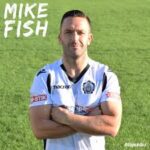
Mike Fish
Born on the 14th September 1985, Mike Fish cemented himself as a modern-day Mossley AFC legend over a career that spanned 10 seasons at Seel Park.
Originally signing from Stalybridge Celtic in September 2007, Mike went on to be top scorer for the club in the 2008-09 season, amassing an impressive 20 goals. In his first spell with the Lilywhites, Mike made 74 appearances, scoring 25 goals.
A brief spell at Curzon Ashton followed but Mike was back at Seel Park in November 2009 where he stayed until 2011, making a further 73 appearances, scoring 21 goals in the process.
The closed season saw him join Curzon Ashton for a second time, before having stints with Stocksbridge Park Steels and New Mills.
He rejoined the Lilywhites for his thrid spell in 2014, enjoying his most prolific spell at Seel Park, making 90 appearances and scoring 42 goals. Mike’s stand-out form in the 2016-17 season saw him score 22 goals in 28 appearances before moving on to Brighouse Town.
Having left Brighouse for Colne, Mike returned to Seel Park for the fourth and final time in September 2017. As part of a squad that was pushing for promotion, he scored 14 goal in 73 appearances, surpassing 300 total appearances for the Lilywhites whilst also joining the elusive 100 goals club.
Mike’s achievements cannot be understated – he is one of only 5 players in our history to over 100 goals, and sits alongside just two players as who have played more than 300 games and scored over 100 goals; Dave Moore and Leo Skeete.
Though Mike will go down in the annals of our club’s history for his goals, his skill and footballing brain was a sight to behold, alongside his selflessness; sat on 99 goals for the Lilywhites, Mike assisted four goals against Market Drayton Town instead of scoring his 100th, a feat he finally achieved away to Radcliffe Borough.
In May 2014, Mike became the first ‘modern day’ player to join the Hall of Fame.
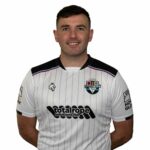
Andrew Keogh
Born on Boxing Day 1987, Andrew Keogh etched his name into the Mossley AFC history books over a career spanning 11 seasons at Seel Park.
Andy’s footballing career began as a youth team player at Altrincham, before he went on to represent Wythenshawe Town, Flixton and Winsford United. He moved to Mossley in August 2013 but his first spell didn’t last long, moving to Nantwich Town in December 2013.
He returned for a second spell in August 2014 where he stayed until 2017 when he joined Trafford FC.
His final spell with the Lilywhites could most certainly be described as his most eventful spell! Re-joining in February 2018, Andy quickly established himself as a fan’s favourite. His versatility lead him to play in every position across the field (except left-back), even donning the gloves following a sending-off. Andy will be best remembered as a central midfielder who never lost an eye for goal, scoring many famous goals, including FA Cup overhead kicks, finishing off flowing team moves and even a spectacular lob in a Boxing day clash at home to Stalybridge Celtic.
Following the departure of David Wild, Andy took on the role of first team manager for the remainder of the season; a role in which he excelled – he would lead the team to it’s first away point of the season followed by two creditable away victories at Clitheroe and Prescot Cables before the season was cut short due to the Covid pandemic.
Andy made a total of 343 appearances for the Lilywhites, making him the sixth highest appearance maker in our history – sandwiched between Leo Skeete (351) and Lennie Dickenson (338). His tally of 68 goals in that time put him 16th on our list of highest goal scorers.
As a mark of the esteem in which he is held, and his contribution to the club, in 2022 Andy became the first person to be awarded to Mossleyweb player of the year award twice in it’s history.
Andy was inducted into the Hall of Fame in May 2024.
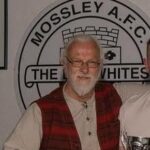
John 'Wiz' Cawthorne
Born in 1957, and adopted at just six weeks old by Dennis and Joan, John ‘Wiz’ Cawthorne will be remembered forever as a man who loved his football club, who volunteered countless hours for his club and a man who achieved more as a volunteer than many people could claim in the professional world.
A programme editor, a tannoy announcer and a historian, he has left a legacy on the club that few can touch.
From being a young boy, he travelled up and down the country following the Lilywhites, even managing to get his Dad Dennis in to it too. The Cawthorne Memorial (Mossleyweb) Trophy was named in memory of Dennis and remains one of the most prestigious awards handed out at our end of season awards ceremony.
As a programme editor, he produced programmes that stood out from the crowd; the quality of content and hours of work poured into each programme shone and stood out as one of the best value programmes in non-league football.
As a tannoy announcer, he was infamous. Beyond the music there were the moments where he couldn’t hide his disappointment at results; most notably telling a referee he was ruining the game over the tannoy! His farewell of “If you’re driving, don’t forget your car” stirs fond memories to many and will never be forgotten by supporters.
However, his most notable footballing achievement will always remain as ‘Mossleyweb’. Wiz became the official club historian in his later years, but the reality is that title doesn’t do him justice. In Mossleyweb, he created the most complete and detailed club history known in almost all football. Every player who donned the Lilywhite shirt is written about, including stats. Every fixture and result from the start of our history, every kit, every manager even the history of the ground.
No stone is left unturned in a website that hosts so much information that it is clear to see how much love went into it’s creation.
Even now, the website is used frequently and even now people find hidden gems they’d never seen or read before. It is more than a website, it’s a remarkable collection of work that sums up the man; brilliant, passionate and totally unique.
Wiz passed just before the start of the 2022-23 season. His website, work and trophy will forever be a reminder of the impact he had on his club and community.
Wiz was inducted into the Hall of Fame in May 2024.
The Mossley AFC Hall of fame wouldn’t be possible without the passion and dedication paid to the club’s history by John ‘Wiz’ Cawthorne. The information from this page came from mossleyweb and it dedicated to ‘Wiz’.
